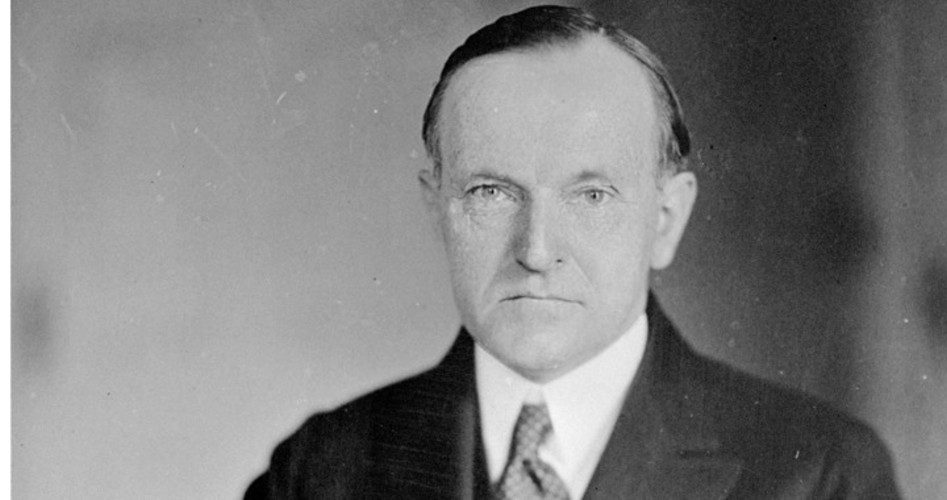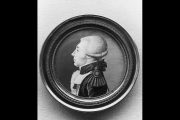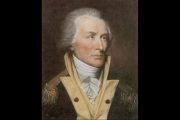
If brevity is the soul of wit, it is unfortunate that Calvin Coolidge (shown) is remembered more for his greatly exaggerated brevity than for his frequently overlooked wit. Indeed, two of the famous quotes attributed to Coolidge have often been cited to suggest dullness rather than keenness of insight.
“The business of America is business,” our 30th president said, suggesting to some people a too narrow view of the meaning of life and politics in this blessed Republic. Worse, a badly worded statement about unemployment (“When more and more people are thrown out of work, unemployment results.”) makes our 30th president seem as rhetorically inept as our 43rd. But unlike George W. Bush, Calvin Coolidge would have seen the folly of getting the federal government more heavily and unconstitutionally involved in the education of American children, to the point where President Obama is now calling for a national preschool program. And while the man from Plymouth Notch, Vermont, sometimes displayed a New England style of folksiness, he did not take the kind of liberties with rules of grammar and logic the second President Bush took when he spoke of how “wings take dream” and raised the question, “Is our children learning?” Nor did Coolidge have Bush’s peculiar talent for expressing sympathy for Americans “working hard to put food on your family.”
When the White House staff was but a fraction of the size it is today, a popular story of Coolidge concerned the question of how many people he had working for him at the White House. “About half of them,” came the reply. Whether the issue was government employees, the federal budget or collegiality in the U.S. Senate, Coolidge was an acknowledged master at getting to the heart of the matter quickly, decisively — and succinctly. Once a senator was foolish enough to complain to the president of a colleague who had told him to go to hell.
“I looked up the law, Senator,” Coolidge replied, “and you don’t have to go.”
Sticks and stones may break our bones, we learned in grade school, but names will never harm us. Coolidge said essentially the same thing, though far more cleverly. Yet he was rarely, if ever, clever merely for the sake of being clever. It could not fairly be said of Coolidge what was said years later about the brash and controversial journalist, William F. Buckley, Jr. “Mr. Buckley,” former Attorney General Ramsey Clark complained during a debate, “would rather be clever than right.”
“I don’t know why anyone would rather be clever than right,” his nemesis coolly replied, “when the good Lord has given him the option of being both.” The good Lord surely gave Coolidge the option of being both. And Coolidge, being economical in all things, was not inclined to waste the blessings of the Lord.
“I am for economy,” Coolidge said. “After that I am for more economy.” President Clinton came into office promising to “focus like a laser beam” on the economy. (Bush 43, sinking his teeth into a task, described himself “a pit bull on the pant leg of opportunity.”) While the 42nd president did preside over a thriving economy, Coolidge’s laser beams were far more powerful and effective. Coolidge was the vice president who inherited the chief executive job when the scandal-plagued Warren Harding died in August 1923. Elected in his own right in 1924, he presided over a nation still enjoying record prosperity when he retired from the White House on March 4, 1933. In a new biography, titled simply Coolidge, Amity Shlaes has highlighted some of the remarkable achievements the nation enjoyed during Coolidge’s time in the White House.
Under Coolidge, the top income tax rate came down by half, to 25 percent. Under Coolidge, the federal budget was always in surplus. Under Coolidge, unemployment was 5 percent or even 3 percent. Under Coolidge, Americans wired their homes for electricity and bought their first cars or household appliances on credit. Under Coolidge, the economy grew strongly, even as the federal government shrank.
Under Coolidge, the rates of patent applications and patents granted increased dramatically. Under Coolidge, there came no federal antilynching law, but lynchings themselves became less frequent and Ku Klux Klan membership dropped by millions. Under Coolidge, a man from a town without a railroad station, America moved from the road into the air.
Not bad for a man critics have derided for decades as a “do-nothing president.” It was precisely by making sure the government did less than “progressives” desired that Coolidge left room for the American people to do more, as “the business of America” prospered. In an era of growing prosperity, the rich, while paying at a lower rate, actually paid a greater share of the income tax than they had under the higher rates. And it was not only the rich who prospered in the days of “Coolidge prosperity.” As President Kennedy would later observe, “A rising tide lifts all boats.” The man called “Silent Cal” couldn’t have said it better himself.
Both Kennedy and Ronald Reagan realized that lower rates of taxation could spur increased productivity that would result in higher yields of revenue. Both men, accordingly, pushed tax cuts for economic growth. While Kennedy was not inclined to praise Calvin Coolidge, Reagan riled Democrats by replacing the portrait of Harry Truman in the Cabinet Room with a painting of Coolidge.
The gesture was symbolic, but symbols don’t balance budgets, and neither did Reagan. During his eight years in office, the beloved Gipper, for all his conservative rhetoric, presided over a near doubling of the federal budget and near tripling of the national debt. Republicans could blame the Democrats in Congress, though Republicans held a majority of the Senate seats for the first six years of Reagan’s tenure and could have blocked spending measures passed by the House. And, of course, Reagan could have made more frequent use of the veto. As it was, though the spending priorities differed, the budgets passed by Congress were often slightly less than those proposed by Reagan. Despite his professed admiration for Coolidge, it may be that Reagan, a former New Deal Democrat, never got over his infatuation with Franklin Roosevelt.
Historians and political scholars over the years have placed Coolidge anywhere from 23rd to 33rd in polls ranking U.S. presidents. Perhaps because he neither started a war nor prolonged an economic crisis, he will likely never make the “great” or even “near great” category. Coolidge seemed to anticipate that and seemed not at all to mind. Lincoln’s rhetoric was made immortal in no small part by his seemingly homespun ability to wrap grandeur in humility. “The world will little note nor long remember what we say here,” he said at Gettysburg, thereby ensuring through the power of his eloquence that the world would long remember what he said there. Coolidge, in his less grand but no less wise rhetoric, uttered a simple but profound thought that might amaze those who like to rate presidents according to their “greatness”:
“it is a great advantage to a president, and a major source of safety to the country, for him to know he is not a great man.”
Photo of Calvin Coolidge: AP Images



